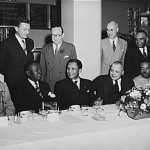Seventh Circuit Week in Review: Terrible Tragedy=Maximum Sentence?
 The Seventh Circuit had four new opinions in criminal cases last week. The court did not break new ground in any of them, but one raises some interesting sentencing issues. I’ll first discuss that case, United States v. Wise (No. 08-2794), and then briefly summarize the other three, which dealt with the definition of “crack cocaine,” disparity in the sentencing of codefendants, and the constitutionality of a gun possession statute, respectively.
The Seventh Circuit had four new opinions in criminal cases last week. The court did not break new ground in any of them, but one raises some interesting sentencing issues. I’ll first discuss that case, United States v. Wise (No. 08-2794), and then briefly summarize the other three, which dealt with the definition of “crack cocaine,” disparity in the sentencing of codefendants, and the constitutionality of a gun possession statute, respectively.
First, the Wise case arose out of terrible tragedy. Wise left a loaded firearm on a window ledge in his girlfrend’s apartment, where it could be reached by children. You can already guess where this is headed: a four-year old left unattended in the room for a few minutes picked up the gun, the gun discharged, and a two-year old was killed. Wise was charged in Illinois state court with reckless endangerment of a child resulting in the child’s death. Wise, however, was a felon, and so his possession of the firearm was a federal crime, too. State charges were apparently dropped, as federal prosecutors charged Wise with the gun possession crime. Wise pled guilty. The sentencing judge decided to sentence Wise above the recommended sentencing guidelines range and give Wise the maximum, ten years. Wise challenged his sentence on appeal, and the Seventh Circuit (per Judge Evans) affirmed.


